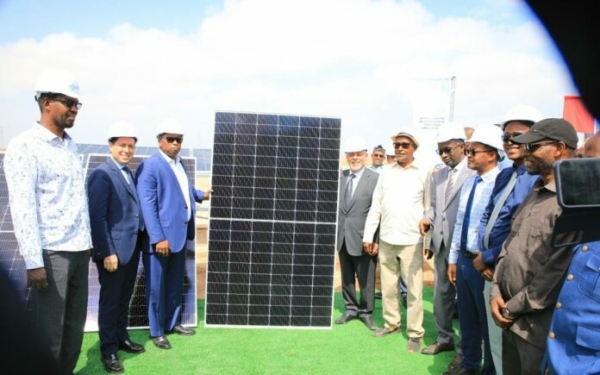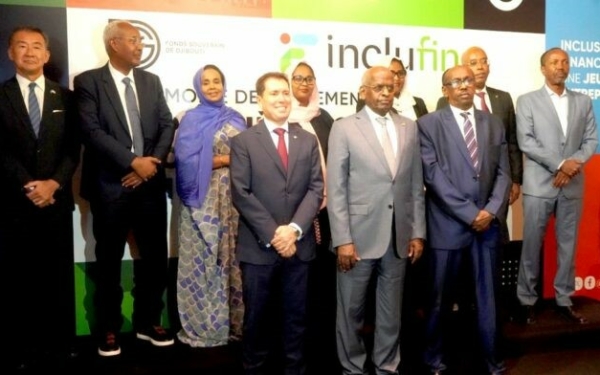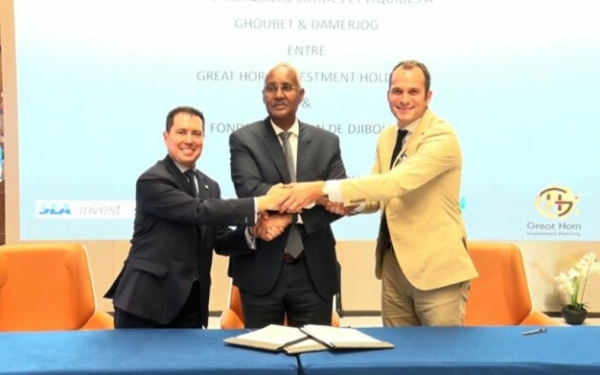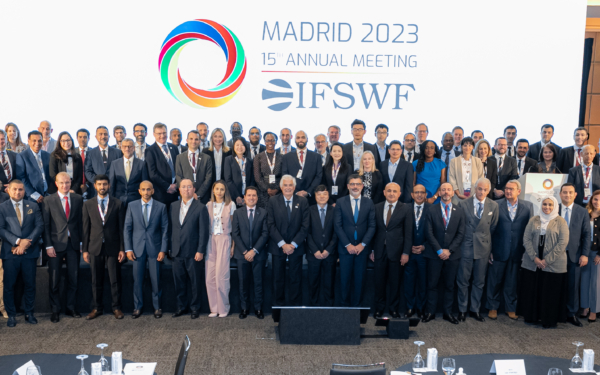Copyright © FSD. All rights reserved
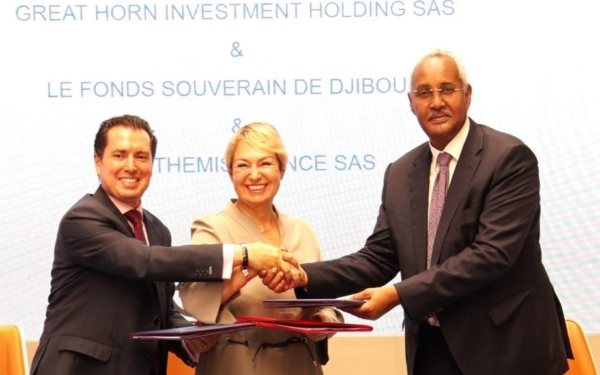
22/06/2023
FSD-GHIH-NEO THEMIS: HISTORIC AGREEMENT FOR ENERGY INFRASTRUCTURE DEVELOPMENT
On thursday 15 June 2023, the Sovereign Wealth Fund of Djibouti (FSD), Great Horn Investment Holding (GHIH) and NEO THEMIS signed an important and historic agreement. The signed contract commits NEO THEMIS to building two solar power plants, a seawater desalination plant and a liquefied natural gas storage facility at pre-defined rates and within pre-defined timeframes. This marks a major step forward in the development of energy infrastructure, among other things. This event marks the culmination of several months of intensive studies, consultations and discussions between all the parties involved in bringing this project to fruition from scratch.
The concluded agreement, acronymized as a Memorandum of Understanding (MOU), aims to make the two new and largest free trade zones in the country self-sufficient in electrical energy. These zones are the Djibouti International Free Trade Zone (DIFTZ), covering an area of 47 km2 at PK23, and the Djibouti Damerjog Industrial Park (DDIP), spanning an area of 30 km2 in Damerjog. The main goal of this partnership is to ensure the energy independence of these free trade zones while promoting the use of renewable energy.
To establish this project, guarantee the energy independence of these free trade zones, and align with the national strategy of transitioning to renewable energy, two solar power plants will be built in the first phase within a record time of 12 to 15 months, thanks to self-financing (avoiding the lengthy process of attracting concessional debt financing through international development financial institutions). The first solar power plant (at PK23) will generate 2 megawatts, and the second plant (at Damerjog) will generate 5 megawatts. In total, the agreement is for 5 MW at PK23 and 10 MW (including energy required for the seawater desalination plant) at Damerjog. Additionally, a seawater desalination plant with a capacity of 5000m3 (with an initial stage of 2500m3) and a liquefied natural gas (LNG) storage unit with a capacity of 3500m3 will be constructed.
THE SIGNIFICANCE OF FDI FOR DJIBOUTI
The rate for solar energy produced by these solar power plants will be the lowest and most competitive in the country’s history, especially considering the absence of transmission losses due to the proximity of the solar power plants to the customers (the two free trade zones in question). This will contribute to improving the productivity and competitiveness of the two free trade zones and, consequently, to Djibouti as a whole.
It is important to note that:
- By producing 15 MW (between the two phases, 50% next year and 50% later) in the two solar power plants located in the PK23 (or DIFTZ) and Damerjog free trade zones, we would generate the equivalent of approximately 12.5% of national consumption (120 MW) and 25% of national production (nearly 60 MW) from fossil fuels.
- Given that over 50% of national consumption (more than 60 MW out of a total of 120 MW) comes from Ethiopia, the two solar projects would reduce our electricity imports by 25%, which is a decrease of about 15 MW from the current 60 MW. Additionally, they would contribute to reducing our annual imported electricity bill by approximately $2.5 million, which would have a positive impact on our trade and current account balances, and consequently on the growth of our GDP.
- Our investments in solar energy for a capacity of 15 MW, including study and other costs, would amount to around $20 million. Furthermore, our investments in a seawater desalination unit with a capacity of 5000 m3 would also be approximately $20 million. Therefore, the total investment amount, excluding the gas storage units, would be around $40 million. This will have a direct impact of boosting our GDP by over 1% (given that our GDP is estimated at $3.6 billion in 2023), in addition to job creation during the construction phase and later during the operational phase. There will also be an indirect impact through local SMEs and subcontractors in terms of boosting the GDP and job creation by participating and providing services in all stages of project implementation and operation. This represents the first level of positive impact on Djibouti’s economic growth. The second level is through the improvement of productivity and competitiveness, and the third level is through the improvement of the trade and current account balances.
- This aligns with the energy transition and economic transition towards a “green economy” with 100% renewable energy by 2035, as already achieved by countries like Portugal and Costa Rica.
- As always, the FSD, as the financial and investment arm of the state of Djibouti, will hold a 25% stake in the capital of these projects, fully playing its role as one of the country’s showcases and a catalyst for attracting foreign direct investments (through NEO THEMIS in this case) representing 75% of the equity for the $40 million investment/co-investment. FDI (Foreign Direct Investments) are vital for the development and prosperity of any developed, emerging, or developing country.
THE DEVELOPMENT OF A WIN-WIN PARTNERSHIPS
Following their initial visit to the Sovereign Fund of Djibouti (FSD) in November 2022, NEO THEMIS, a leading investment group with access to the $12 billion managed by their financial partner Denham Capital, was specifically chosen by the Sovereign Fund of Djibouti as a preferred partner. NEO THEMIS operates in several African countries and has its main office in Paris, with an additional office in Casablanca. The FSD selected NEO THEMIS due to its immense investment potential and global reputation in infrastructure development in Africa, where they are known for their unparalleled expertise. The NEO THEMIS team has over 200 years of combined expertise, with 100 years dedicated to investing in multi-billion-dollar projects in Africa.
During their second visit to Djibouti, NEO THEMIS signed two Memorandums of Understanding (MOUs). The first MOU was signed with the FSD, and the second MOU, this time tripartite, was signed with the FSD and GHIH.
With their expertise, financial resources, and extensive network of international relations, the NEO THEMIS Group will play a crucial role in the success of these large-scale projects.
UNITY IS STRENGTH
During the signing ceremony of the tripartite agreement, which took place at the GHIH exhibition center, Dr. Slim FERIANI, CEO of the FSD, expressed his appreciation to his partners (GHIH and NEO THEMIS), emphasizing that “unity is strength. The signing of this tripartite agreement is of crucial importance for achieving the objectives set by the Head of State in his ‘Vision 2035,’ which aspires, among other things, to inclusivity and sustainability. The realization of these ambitious goals inevitably requires investments, particularly Foreign Direct Investments (FDI). Our objective as the FSD is to contribute to the energy independence of the country but, above all, to achieve financial and economic independence by targeting a portion of the $4 trillion in equity managed by investment funds like NEO THEMIS, Meridiam, Kasada, etc., as other sovereign funds have successfully done before us. We are also working to attract FDI for the development of the two major strategic projects represented by the two free zones developed and managed by GHIH.“
In her speech, Ms. Tas AVANRIPOUR, CEO of NEO THEMIS, directly addressed the President of GHIH and the CEO of the FSD, emphasizing the importance of this long-term partnership. She stated, “We are aware of your ambitious growth strategy and wish to grow with you as institutions and as a country. This first step demonstrates our willingness to be associated and to collaborate closely with you. We will start modestly with these solar, seawater desalination, and liquefied natural gas storage projects, and then we envision larger investments in the country. I would like to sincerely thank you, as well as your respective teams, for your efficiency and for approaching these negotiations with a spirit of trust and solid partnership.“
In his remarks, Mr. Aboubaker Omar HADI, President of GHIH, highlighted “the critical importance of these investments in the Free Zones, which are essential pillars of the national economy.” He clearly emphasized the crucial role of foreign direct investments in the country’s development and economic growth.
ACHIEVEMENTS OF FSD
The FSD has made significant progress over the past 18 months, attracting foreign direct investments (FDI) and establishing strong partnerships with key players such as NEO THEMIS. This tripartite agreement represents a major milestone in the pursuit of Djibouti’s “Vision 2035” set forth by President Ismaël Omar Guelleh, aiming, among other things, for national energy self-sufficiency. As a strategic hub for trade and exchanges in East Africa, Djibouti will fully benefit from this collaboration. It will strengthen its position on the regional and international stage by developing essential infrastructure. This partnership will foster economic growth, job creation, and the emergence of new professions, while enhancing the country’s productivity and competitiveness. It will also strengthen our capabilities in project design, execution, and management. New opportunities are thus emerging to accelerate the country’s sustainable development process. With this historic agreement, FSD, GHIH, and NEO THEMIS are committed to shaping Djibouti’s energy future together, making a significant contribution to the realization of “Vision 2035” and the acceleration of the country’s economic growth. The initial investments by NEO THEMIS began on Monday, June 19th, 2023, marking the concrete start of this promising collaboration. This agreement signing ceremony took place just a few days before the celebration of the Independence Day on June the 27th.
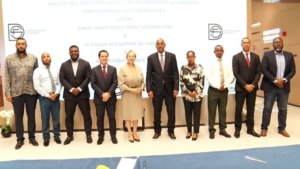
-End-
